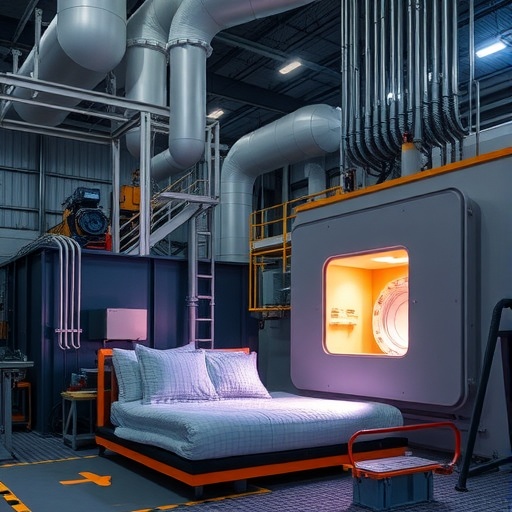In an innovative stride toward sustainability, experts at Aberystwyth University are leveraging the power of artificial intelligence (AI) and machine learning to transform the ceramics industry. The primary focus of this groundbreaking collaboration with Parkinson-Spencer Refractories (PSR), a venerable family-run business with over two centuries of history, is to enhance kiln operation efficiency. By optimizing the packing of ceramic products within kilns, the project aims to address not only energy consumption but also the carbon footprint associated with ceramic manufacturing—an urgent concern in our environmentally-conscious age.
At PSR’s facility in West Yorkshire, the current kiln volume utilization stands alarmingly low at around 9%. This inefficiency is largely attributed to the irregular shapes and sizes of the ceramics being fired, coupled with complex loading procedures. As a result, PSR experiences high energy costs while contributing to significant greenhouse gas emissions. The need for improvement in kiln packing is clear; maximizing the capacity of these energy-intensive processes could lead to remarkable advancements in both production rates and environmental responsibility.
The history of PSR—a company that has catered to the glass industry for generations—is rooted in craftsmanship and quality. However, as the modern world increasingly demands energy efficiency and sustainability, traditional methods in ceramics manufacturing face severe scrutiny. Improving the structural integrity of kiln operations, thereby enhancing the volume utilization rate, could allow PSR to meet contemporary demands for both production efficiency and environmental stewardship, marking a significant evolution in the industry.
In response to these challenges, Aberystwyth University and PSR recently secured funding through the Knowledge Transfer Partnership (KTP) program, a scheme sponsored by Innovate UK and the Welsh Government. This initiative is designed to promote collaboration between academia and industry, facilitating the exchange of expertise and resources that could reshape operational methodologies across sectors. The partnership is set to yield both technical advancements and a deeper understanding of the applications of AI in practical, real-world situations.
Dr. Odin Moron-Garcia, who is appointed to spearhead this project, brings with him a wealth of knowledge and a Ph.D. in computational problem-solving. His focus will be on developing customized algorithms capable of accurately assessing the optimal arrangement for ceramic items within the kiln. By utilizing machine learning techniques, these algorithms will be engineered to analyze various factors, including product geometry and kiln space restrictions, ultimately leading to denser and more efficient kiln loading strategies.
Dr. Adil Mughal, a faculty member at Aberystwyth University and the lead researcher, emphasizes that this collaboration stands to bridge the gap between theoretical mathematics and practical industrial applications. The goal is to formulate cutting-edge solutions that not only optimize production but also contribute to the industry’s vital transition toward sustainability. As the ceramics sector faces mounting pressure to lower its environmental impact, this research offers promise by directly aligning with both economic and ecological imperatives.
The implementation of these AI-driven solutions is anticipated to lead to a transformative increase in kiln capacities. By enhancing how ceramic products are arranged before firing, PSR can significantly improve its energy dynamics—potentially diminishing the energy costs associated with each batch fired. Furthermore, such improvements could have broader implications for the entire industry, promoting similar shifts in manufacturing practices among competitors.
Simon Parkinson, managing director of PSR, expresses keen enthusiasm regarding the collaboration, recognizing the potential benefits of more energy-efficient production methodologies. This partnership represents not only a strategic move for PSR but also a vital step toward attaining greater sustainability as a corporate goal. As the push for environmental accountability intensifies, this initiative could serve as a model within the ceramics sector, where energy consumption and waste management often challenge profitability and ecological stability.
Moreover, the partnership between Aberystwyth University and PSR illustrates the broader importance of academia in the innovation ecosystem. Knowledge Transfer Partnerships such as this one enable enterprises to tap into the latest academic findings and technical expertise, fostering innovative thinking while addressing industry-specific challenges. For researchers, these collaborations offer the opportunity to see their theories and mathematical models materialize in the form of tangible industrial practices, reinforcing the critical link between research and economic development.
In summary, this groundbreaking collaboration exemplifies how the integration of AI into traditional industries can pave the way for revolutionary changes. By addressing long-standing inefficiencies, the application of advanced computational techniques to kiln loading holds the potential to redefine the landscape of ceramics manufacturing. Such strides not only fulfill immediate economic needs but also endorse an ongoing commitment to environmental responsibility, championing the essential balance between industry innovation and sustainable practices.
As these developments unfold, the ceramics industry will be watching closely. The implications of dense packing methodologies could lead to enhanced production capabilities and diminished carbon footprints, ultimately charting a course for a more sustainable future in ceramics. Engaging with cutting-edge research, PSR is poised to become a leader in responsible manufacturing practices, setting the standard for others in the industry to follow.
This partnership serves as a beacon of hope in tackling the complex problems that manufacturers face today. The marriage of AI technology with traditional craftsmanship is a litmus test for the broader industrial sector, showcasing the promise that lies in embracing innovation to foster sustainability. Such initiatives are not only crucial for individual businesses but are vital for driving systemic change across manufacturing industries worldwide.
In conclusion, the innovative potential of artificial intelligence and machine learning in optimizing kiln operations is an exciting front in the ongoing quest for sustainability within the ceramics industry. As PSR and Aberystwyth University embark on this transformative journey, the lessons learned and successes achieved could well define the future of ceramics manufacturing, exemplifying a thriving, energy-efficient, and environmentally responsible industry for years to come.
Subject of Research: AI in ceramics manufacturing and kiln packing optimization
Article Title: Leveraging AI for Sustainable Ceramics: A New Era of Efficiency
News Publication Date: October 2023
Web References:
References:
Image Credits:




